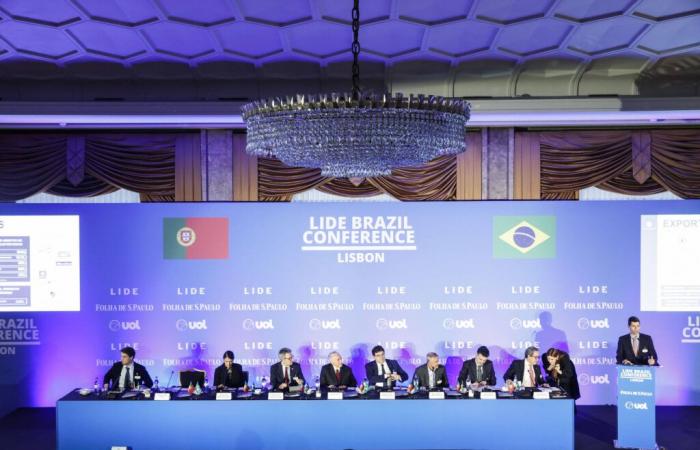Portugal is a land of opportunities for Brazil, and vice versa. There is still a long way to go, but the first steps are being taken, and they are promising.
This idea was in the air after the table “New Opportunities for Industries and Services in Brazil and Portugal”, in the fourth panel of the Lisbon Conference, an event held by Lide, Sheet and UOL this Friday (15), in the capital of São Paulo.
The debate was opened by Francisco Saião Costa, advisor to Aicep, the Agency for Investment and Foreign Trade of Portugal. The two countries are connected by 96 weekly TAP flights — which take Portuguese people, on vacation or business trips, to 11 different destinations in Brazil.
On the other hand, hundreds of thousands of Brazilians have chosen Portugal to live in recent years — to be exact, 600 thousand, in this year’s numbers. Even so, the two countries’ trade is still limited to little more than olive oil, oil and some agricultural products. How to make the most of opportunities?
An eloquent response was given by Marco Stefanini, founder and global CEO of the Stefanini Group, a Brazilian information technology multinational.
“Portugal has positioned itself very well as a technology hub. It is also a multilingual country, much more so than others in southern Europe, and this is essential for employing qualified labor,” said Stefanini. “Brazil already has an immense workforce in the technological area, and sees Portugal as a gateway to Europe.”
For Stefanini, going beyond commodities and agricultural products, the two countries could establish a major alliance in the area of technology.
In addition to opening up to the European market —”Portugal can be an aircraft carrier for Brazilian companies”, in the words of Francisco Saião, from Aicep—, the Iberian country is the seventh most peaceful place in the world, fourth in the cybersecurity ranking and 19th in political stability.
“All of this makes Portugal an attractive destination for Brazilian companies”, says Karene Vilela, president of the Portuguese Chamber of Commerce of São Paulo. There are 74 CPCs in the world, and the two largest are those in São Paulo and Paris, which gives a measure of Brazil’s importance for Portugal.
The Portuguese Chamber of Commerce of São Paulo is also an example of how the European country intensifies its relationship with subnational entities. In his speech, the governor of Minas Gerais, Romeu Zema, affiliated with the Partido Novo, recalled that the Portuguese hotel chain Vila Galé is opening units in two cities in his state, Ouro Preto and Brumadinho, where the Inhotim institute is located.
Zema also recalled that Minas Gerais began producing wines in Serra da Mantiqueira. “We do this with the advice and cooperation of the Portuguese wine industry. It is still a small production, but it is growing at a rate of 25% per year, which means that it will soon be significant,” said the governor.
In line with what appears to be the most potential collaboration between Brazil and Portugal —technology—, the governor of Piauí, Rafael Fonteles, from the PT, reported that his state is advanced in a policy of “educational and technological shock”.
The government has been transforming the 502 state public schools into professional and technical education centers. “Our model is still very academic. We want to train young people from high school in careers such as systems development and game programming, which can place them in the job market.”
The former governor of São Paulo, João Dória, co-chairman of the Lide group, took to the stage to praise Fonteles’ speech. “How good it is, in terms of polarization, to listen to someone who is in the world of common sense. Fonteles made an assertive speech for the good of his state.”
The last to speak, former president Michel Temer, followed the same line. According to him, governments of different ideological colors follow the same common sense rules, although with different names. “In my government we implemented the spending ceiling, the current government talks about a fiscal framework. But what is the framework if not a readjusted ceiling?”
Temer ended his speech by drawing a parallel between Portugal and Brazil. “We are two countries that emerged from authoritarian governments and created lasting Constitutions, ours is 36 years old, Portugal’s is 40 years old. They are lasting because they managed to amalgamate liberal rights with social rights, including workers’ rights,” said Temer . “It doesn’t make sense that we have this thing in Brazil of Brazilians against Brazilians, institutions against institutions.”






